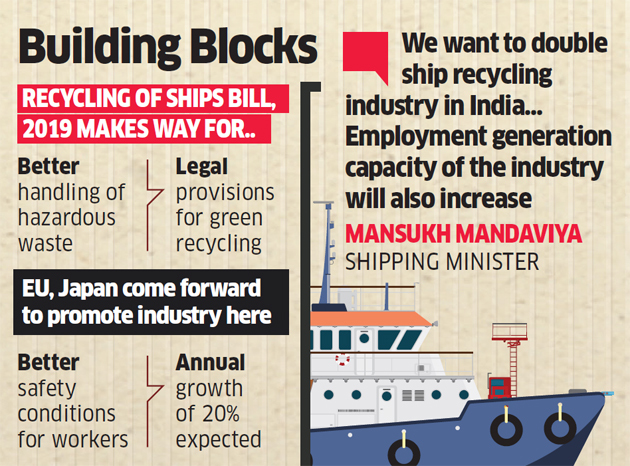The Recycling of Ships Bill, 2019 – Diligent IAS 30/12/2019 – Posted in: Daily News – Tags: ship building

The-Recycling-of-Ships-Bill-2019 Image: Economic Times
The Recycling of Ships Bill, 2019
For: Preliminary & Mains
Topics covered: The Recycling of Ships Bill 2019
News Flash
Parliament passed “The Recycling of Ships Bill 2019″ for Safe and Environmentally Sound Recycling of Ships in India. The Bill restricts the use of hazardous material on ships and regulates the recycling of ships.
The existing Shipbreaking Code (revised),2013 and the provisions of the Hong Kong Convention, 2009 are dovetailed in this Bill.
Benefits of the Bill
- The bill will harbinger a significant increased number of global ships entering into Indian Shipyards for Recycling.
- Recycling of Ships will boost business & employment opportunities and strengthen India’s position in the recycling industry.
- It will raise the brand value of our Ships Recycling Yards located at Alang in Gujarat, Mumbai Port, Kolkata Port & Azhikkal in Kerela.
- 10% of country’s Secondary steel needs, as an outcome of Recycling of Ships, will be met in an eco-friendly manner.
- Ships Recycling facilities will become compliant to International standards and Ships will be recycled only in such authorised facilities.
- The tremendous growth of business activities will contribute to the country’s GDP.
Applicability of the Bill
The Bill will apply to:
- Any new or existing ship which is registered in India
- Ships entering a port or terminal in India, or the territorial waters of India
- Any warship, or other ship owned and operated by an administration and used on government non-commercial service
- Ship recycling facilities operating in India.
Ship recycling
- The Bill defines ship recycling as the dismantling of a ship at a facility to recover the components and materials for reuse, and taking care of the hazardous material so produced.
- It includes associated operations such as storage and treatment of materials and components on site.
Requirements for ships
- Ships should not use prohibited hazardous materials as notified. The central government may exempt certain categories of ships from this requirement.
- The National Authority will carry out periodic surveys to verify the prescribed requirements.
- This Authority will be notified by the central government to administer, supervise and monitor all activities related to ship recycling.
- The owner of every new ship must make an application to the National Authority to obtain a certificate on the inventory of hazardous materials.
- Existing ship owners must apply for the certificate within five years of the commencement of the Act. The certificate must be renewed every five years.
- It must be maintained and updated through the life of the ship to reflect any changes in the ship’s structure and equipment.
- Using hazardous materials in a ship will be punishable with imprisonment of up to three months, or a fine of up to five lakh rupees, or both.
These requirements will not apply to:
- Any warship, or other ship owned and operated by an administration and used on government non-commercial service
- Ships with internal volume less than 500 tonne
Recycling Facilities
- Ships will be recycled only in authorised recycling facilities.
- An application to authorise such a facility must be submitted to the Competent Authority along with a ship recycling facility management plan, and prescribed fee.
- Existing facilities must apply for authorisation within 60 days of the commencement of the Act.
- The certificate of authorisation will be valid for a period as specified but not exceeding five years.
- Contravening these provisions will be punishable with imprisonment of up to one year, or a fine of up to Rs 10 lakh, or both.
- Each Ship Recycler must maintain adequate measures for emergency preparedness and response, safety, health, training, and welfare of workers as per the Factories Act, 1948. It must also provide insurance coverage for the regular and temporary workers.
Recycling Process
- A shipowner must apply to the National Authority for a ready for recycling certificate before recycling his ship.
- The Ship Recycler must prepare a ship recycling plan which should be approved by the Competent Authority. Each ship will be recycled after obtaining written permission from the Competent Authority.
Every ship recycler must:
- Ensure safe and environmentally sound removal and management of hazardous materials from a ship
- Comply with the specified environmental regulations.
On contravening these provisions, the ship recycler will be liable to pay environmental damages and cleanup operation compensation as prescribed.
In case of an oil spill, a ship recycler will be punishable with:
- a fine of up to five lakh rupees in case of no response within 12 hours of issue of the first notice
- a fine of up to Rs 10 lakh in case of no response within 24 hours of issue of the second notice
- imprisonment of up to three months, and a fine of up to Rs 10 lakh in case of no response within 24 hours of issue of the third notice.
Source: PRS India
READ MORE DAILY NEWS
- The Arms (Amendment) Bill, 2019
- The Constitution (126th) Amendment Bill, 2019
- The Code on Social Security, 2019
- ISRO launched RISAT-2BR1
- Human Rights Day
- Human Development Index Report 2019
- 15th Finance Commission Report
- KALIA (Krushak Assistance for Livelihood and Income Augmentation) scheme
- Genetic study of clownfish population
You are on the Best Online IAS preparation platform. You are learning under experts.
We are present on Facebook- Diligent IAS, LinkedIn- Diligent IAS, YouTube- Diligent IAS, Instagram- Diligent IAS. Get in touch with us.
